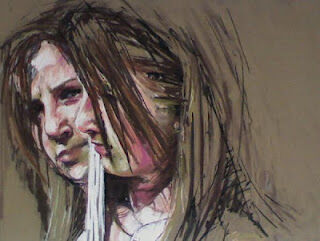Neuroscience
The Neuroscience of Déjà Vu
Déjà vu: brain tricks, or predicting the future?
Posted August 14, 2012

Even the most rational of us experience it: you'll be chatting with friends or exploring a place you've never been when suddenly a feeling washes over you: you've experienced this exact moment before. The familiarity is overwhelming, and it shouldn't be familiar at all. The sensation becomes stronger before ebbing, then completely leaves, all within a matter of seconds. Had you predicted the future? Yet, chances are, you can't pinpoint exactly when you'd experienced that premonition before.
Déjà vu is a French term that literally means "already seen" and is reported to occur in 60-70% of people, most commonly between the ages of 15 and 25. The fact that déjà vu occurs so randomly and rapidly—and in individuals without a medical condition—makes it difficult to study, and why and how the phenomenon occurs is up to much speculation. Psychoanalysts may attribute it to wishful thinking; some psychiatrists cite mismatching in the brain causing us to mistake the present for the past. Still, parapsychologists may even believe it is related to a past-life experience. So what do we know for certain about what happens during an episode of déjà vu?
Some researchers speculate that déjà vu occurs when there is a mismatch in the brain during its constant attempt to create whole perceptions of our world with very limited input. Think about your memory: it only takes small bits of sensory information (a familiar smell, for instance) to bring forth a very detailed recollection. Déjà vu is suggested to be some sort of "mix-up" between sensory input and memory-recalling output. This vague theory, however, does not explain why the episode we experience is not necessarily from a true past event.
A different but related theory states that déjà vu is a fleeting malfunctioning between the long- and short-term circuits in the brain. Researchers postulate that the information we take in from our surroundings may "leak out" and incorrectly shortcut its way from short- to long-term memory, bypassing typical storage transfer mechanisms. When a new moment is experienced—which is currently in our short-term memory—it feels as though we're drawing upon some memory from our distant past.
A similar hypothesis suggests that déjà vu is an error in timing; while we perceive a moment, sensory information may simultaneously be re-routing its way to long-term storage, causing a delay and, perhaps, the unsettling feeling that we've experienced the moment before.
One characteristic is common of all déjà vu experiences: we are completely conscious that they are occurring, implying that participation of the entire brain is not necessary to produce the phenomenon.
Over the years, researchers have pinpointed disturbances of the medial temporal lobe as the culprit behind déjà vu. Studies of epileptic patients investigated via intracerebral electrodes demonstrate that stimulation of the rhinal cortex (such as the entorhinal and perirhinal cortices—structures involved in episodic memory and sensory processing) can actually induce a déjà vu episode.
A study published in the March issue of Clinical Neurophysiology analyzed the patterns of electroencephalography (EEG) signals from the rhinal cortices, hippocampus (involved in memory formation), and amygdala (involved in emotion) in epileptic patients for whom déjà vu could be induced by electrical stimulation.
The researchers (from France!—who better?) found that synchronized neural firing between the rhinal cortices and the hippocampus or amygdala were increased in stimulations that induced déjà vu. This suggests that some sort of coincident occurrence in medial temporal lobe structures may "trigger" activation of the recollection system.
While the cause and precise mechanism of déjà vu remains a mystery, worry not—if it happens, nothing is wrong with you. In fact, bask in the moment and appreciate the strange feeling that washes over you. Or pretend to be a fortune teller.
"It's like déjà vu all over again."
-Yogi Berra, on witnessing Mickey Mantle and Roger Maris repeatedly hit back-to-back home runs in the early 1960s Yankees' seasons.
--
Bartolomei F, Barbeau EJ, Nguyen T, McGonigal A, Régis J, Chauvel P, & Wendling F (2012). Rhinal-hippocampal interactions during déjà vu. Clinical neurophysiology : official journal of the International Federation of Clinical Neurophysiology, 123 (3), 489-95 PMID: 21924679




